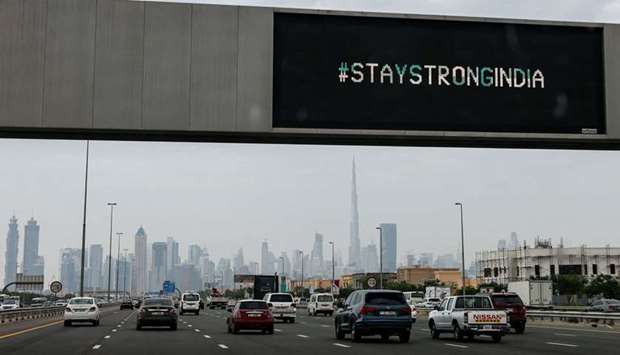The first US emergency aid to India arrived on Friday as the country battles a devastating surge in Covid-19 cases which has overwhelmed hospitals and crematoriums.
The supplies arrived as India recorded another 385,000 new cases in the past 24 hours -- a new global record -- and almost 3,500 deaths, according to official data that many experts suspect falls short of the true toll.
A US Super Galaxy military transporter carrying more than 400 oxygen cylinders, other hospital equipment and nearly one million rapid coronavirus tests landed at New Delhi's international airport early Friday.
The delivery, which flew in from the Travis military base in California, followed talks this week between US President Joe Biden and India's Prime Minister Narendra Modi.
US officials said other special flights, which will also bring equipment donated by companies and individuals, are set to continue into next week.
More than 40 countries have committed to sending vital medical aid, particularly oxygen supplies, Foreign Secretary Harsh Vardhan Shringla told reporters Thursday.
The promised supplies from Britain, Russia, UAE, Qatar, Australia and elsewhere include almost 550 oxygen-generating plants, more than 4,000 oxygen concentrators, 10,000 oxygen cylinders as well as 17 cryogenic tankers.
Hundreds of thousands of doses of Covid-19 treatment drugs as well as raw materials to produce vaccines and remdesivir, were also being sent, he added.
‘It is an unprecedented situation,’ Shringla said.
Japan is the latest to offer help, announcing Friday it would despatch 300 oxygen concentrators and 300 ventilators to India.
‘Japan stands with India, our friend and partner, in her efforts to fight (the) Covid-19 pandemic through this additional emergency assistance,’ the foreign ministry said.
- Doused with petrol -More than 200,000 have now died from the virus in India, more than 45,000 of them in April, although many other nations have suffered far worse death rates on a per capita basis.
Brazil, with a population around a sixth of India, has recorded more than 400,000 deaths.
In many areas outside the main hotspots of New Delhi and Maharashtra, hospitals are running out of beds as relatives of the sick desperately hunt for medicines and oxygen cylinders.
Many crematoriums are facing shortages of wood because of the surge in deaths, with each pyre requiring between 300 and 400 kilos (700-900 pounds) of wood.
Some in the western city of Surat have started using wood that is not entirely dry and crop waste, pouring petrol on the pyre so that the wet wood burns properly.
Kamlesh Sailor, manager of the Kurukshetra Crematorium in Surat said they were setting up four new wooden pyre stands.
‘This will be in addition to the existing eight wooden pyre stands and five gas furnaces that are in use round the clock,’ Sailor said.
- Faltering vaccinations -The Indian government will open vaccinations to all adults from Saturday, meaning around 600 million more people will be eligible.
But several states have warned they do not have sufficient stocks, and the expanded rollout is threatened by administrative bickering, confusion over prices and technical glitches on the government's digital vaccine platform.
Financial hub Mumbai, one of the major cities reeling from the new wave, said late Thursday that it would halt jabs from Friday to Sunday ‘owing to non-availability of vaccine stock’.
Until now, only ‘frontline’ workers like medical staff, people over 45 and those with existing illnesses have been given the AstraZeneca shot or Bharat Biotech's homegrown Covaxin.
But even this more modest programme has faltered.
So far around 150 million shots have been administered, equating to 11.5 percent of the population of 1.3 billion people. Just 25 million have had two shots.

